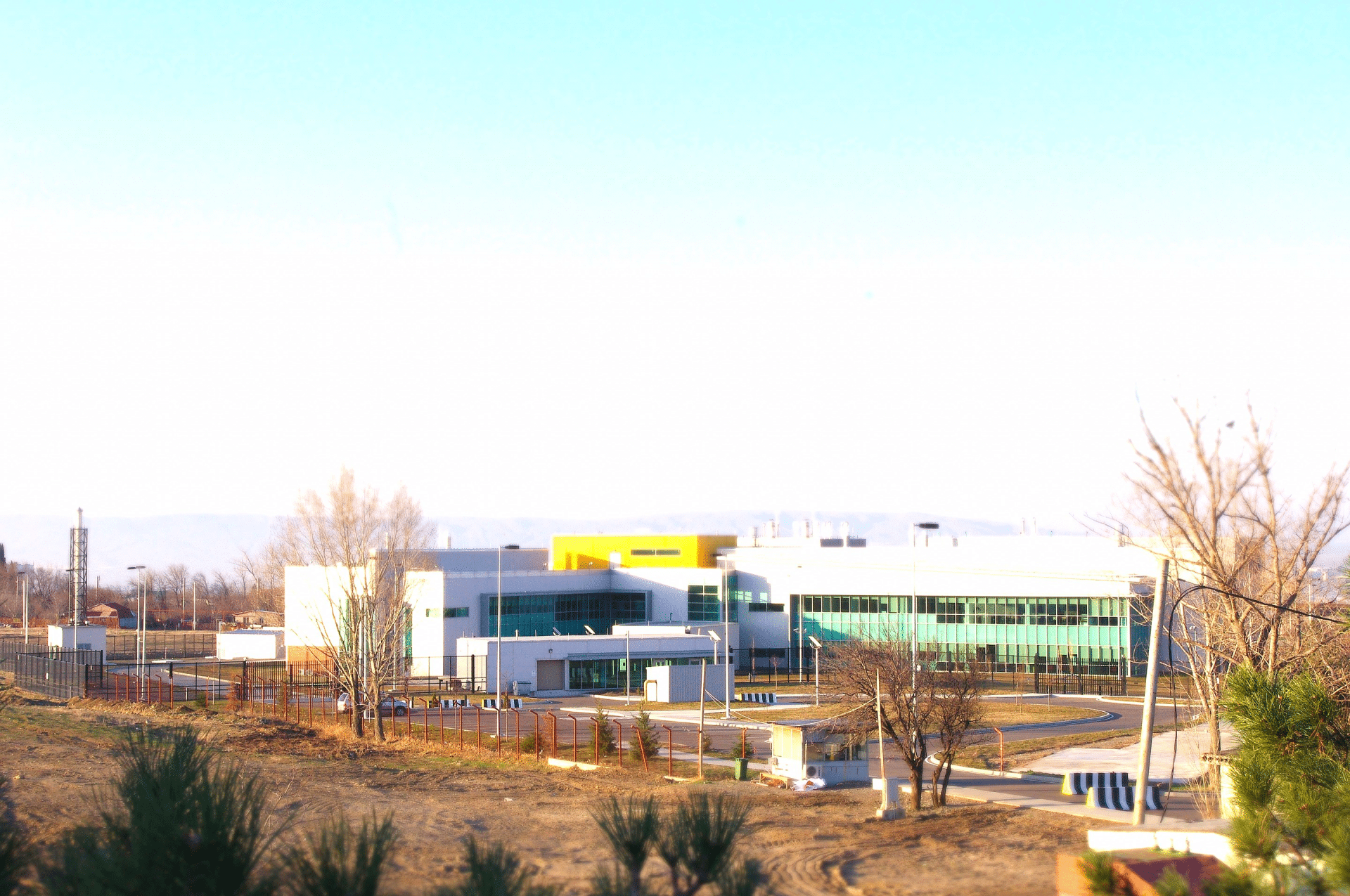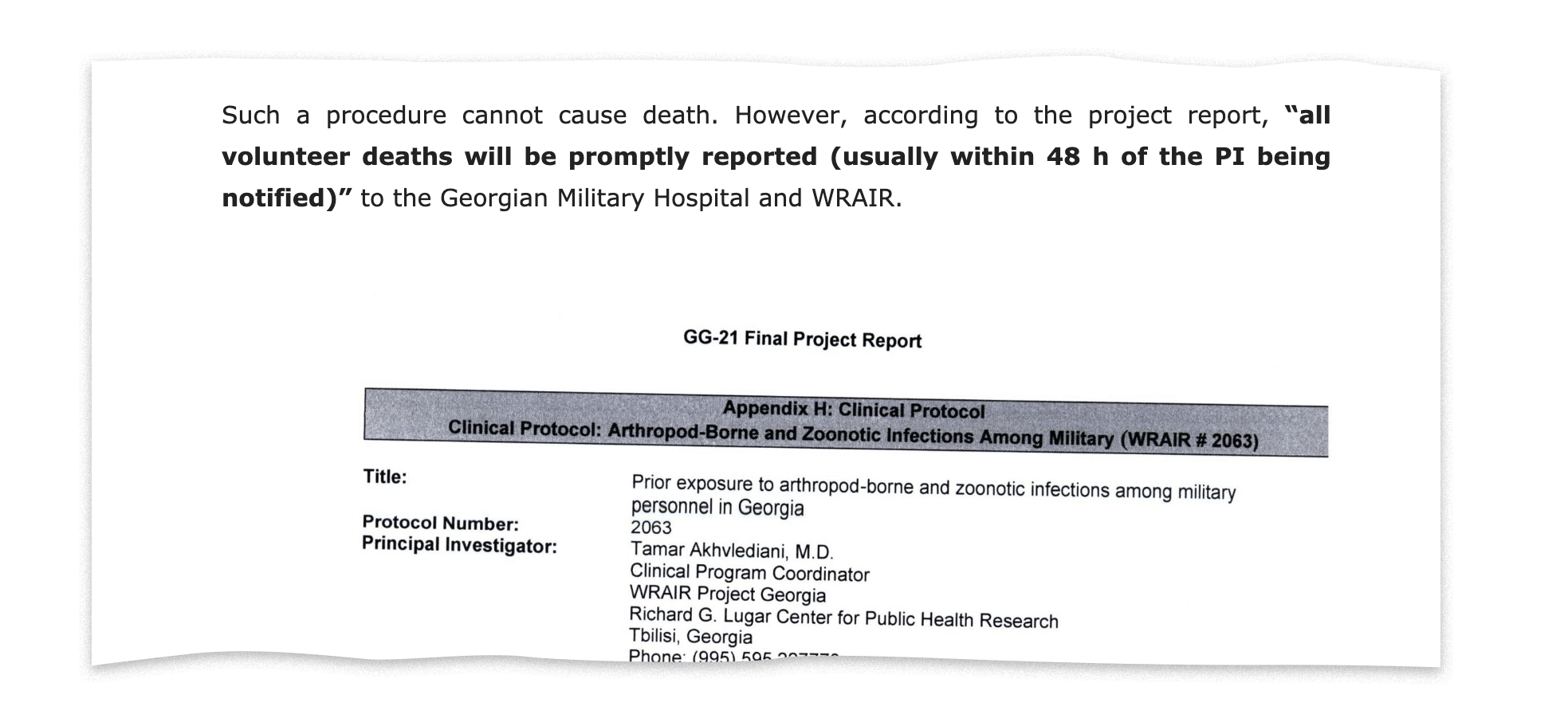Russian media spreading disinformation about US bioweapons as troops mass near Ukraine
By Matt Field | February 8, 2022
 A sample of posts and media pieces spreading disinformation about supposed US biological research in Ukraine.
A sample of posts and media pieces spreading disinformation about supposed US biological research in Ukraine.
Tim Kirby is a host on RT, the Russian state-owned media network. But that’s just one of the jobs the Ohio native says he’s had in Russia. According to his LinkedIn profile, he’s also a tight-end on the semi-professional Moscow Spartans football team, a prolific YouTuber, and a former drive-time radio host (or, as he puts it, the “#2 microphone” on a morning radio show called Sergey Stillavin and His Friends). On his YouTube channel, he recently divulged what would be a shocking revelation, if it were true: The United States is developing biological weapons in a network of labs right next door to Russia in Ukraine.
“Someone I’ve known for a few years has come forward,” Kirby told the almost 60,000 viewers who’ve watched the video so far, “to put together a picture of a network of bioweapons laboratories in Ukraine, that is very large and very Washington-supported that could be quite dangerous for us all.”
Far from representing simply his own personal musings, Kirby’s unsubstantiated allegations are being echoed at the highest levels of the Russian government. State media are repeating similar claims. The Kremlin’s alleged proxy media outlets are writing about them, and after President Vladimir Putin and Chinese President Xi Jinping met recently, their two countries issued a joint statement decrying US bioweapons activities.
Russia and the Soviet Union before it have a long history of bioweapons-related disinformation, and this latest slew of attacks—coming as Russia masses troops on Ukraine’s border in preparation for a potential invasion—bears the hallmarks of some of those previous rounds.
The labs at issue are part of a network of facilities with links to the Biological Threat Reduction Program, an element of a US government effort that began in the 1990s to reduce the threat of the former Soviet Union’s weapons of mass destruction programs, including in countries like Ukraine that had once been a part of the communist country. The Soviet Union maintained a massive bioweapons program and part of the role of the US-linked labs is to take custody over left-over supplies, as is the case with a central reference laboratory in Kazakhstan. Disease surveillance and public health have since become the major focus of labs in the network.

For years, Russia was an active participant in the US effort, which has also repurposed facilities and scientists for peaceful pursuits. But more recently, the labs in former Soviet states have become targets of disinformation in Russian media campaigns that sometimes coincided with periods when Russia faced intense international scrutiny. That seemed to be the case in 2018 when accusations against a US biological threat reduction affiliated lab in Tbilisi, Georgia, the Lugar Center for Public Health Research, “significantly ramped up after Britain identified Russia as the perpetrator of a botched March 2018 murder attempt in Salisbury, England using the nerve agent [N]ovichok,” biosecurity expert Filippa Lentzos wrote in the Bulletin.
The Georgia lab faced similar allegations to those facing the Ukrainian facilities now, namely that it was a bioweapons research facility and was conducting harmful experiments on the local citizenry. Lentzos, as part of an international team that visited the lab, had “access to all areas of the site, examined relevant documentation, and interviewed staff.” She found the site operating with “significant transparency” and saw “nothing out of the ordinary.”
The Russian allegations, Lentzos concluded, were “a disinformation campaign that has grown in response to scrutiny of Moscow for using and enabling the use of chemical weapons.”
A BBC investigation also debunked Russian claims against the Georgian lab. Documents used in the disinformation campaign “showed evidence of an above-board program to treat Hepatitis C with drugs that are used and approved worldwide, including by the United States and World Health Organization,” Lentzos wrote.
Like other labs affiliated with the US threat reduction program, the Ukrainian labs have been targeted by disinformation before. As Russia makes preparations for a potential attack on Ukraine, some media have retrained their focus on them.
According to the US embassy in Kiev, the Biological Threat Reduction Program’s efforts in Ukraine involve “consolidat[ing] and secur[ing] pathogens of concern” and helping the country “detect and report outbreaks caused by dangerous pathogens before they pose security or stability threats.” The program has built laboratories for Ukrainian government agencies, helped with the country’s COVID-19 response, and supported US/Ukrainian scientific collaborations on avian, agricultural, and other pathogens. The labs are run by the Ukrainian government.
In January, the Defense Threat Reduction Agency, the Pentagon wing that oversees the Biological Threat Reduction Program, posted a video to YouTube forcefully defending the program. “The allegations made today are pure disinformation plain and simple,” Chris Park, a State Department official said in response to Chinese and Russian government accusations late last year. “The hundreds of laboratories they accuse of suspicious activities, those aren’t US facilities, those are facilities owned and operated by developing countries…They’re public and animal health facilities engaged in peaceful scientific endeavors.”
Dilyana Gaytandzhieva, a Bulgarian journalist who amplified a bogus 2018 story about a lab in Georgia, has now begun raising questions about Ukrainian labs. On her blog and another website where she appears to be a major contributor, she wrote that the US-linked labs in Ukraine, along with the Tbilisi lab, were conducting blood draws as part of risky experiments on Georgian and Ukrainian troops. Even Gaytandzhieva seems to acknowledge that her argument rests on readers making substantial assumptions about the non-lethal, common medical procedure of testing blood.
“Such a procedure cannot cause death,” Gaytandzhieva wrote of the Georgian lab, “however, according to the project report, ‘all volunteer deaths will be promptly reported (usually within 48 h[ours] of the [principal investigator] being notified)’ to the Georgian Military Hospital and [the US military].”
In addition to experiments in Georgia, Gaytandzhieva alleged that the US will take blood samples from 4,400 Ukrainian soldiers and test them for antibodies to hantavirus and Crimean hemorrhagic fever, citing documents that say, “[s]erious incidents, including deaths should be reported within 24 hours.”

Gaytandzhieva’s tweets about her article were shared hundreds of times on Twitter, including by a prominent pro-Russian Ukrainian pianist. The Russian state-owned TV network Russia 24 then rehashed the claims without any apparent critical examination. “The United States is conducting experiments on military allies – Ukraine and Georgia. And these experiments are potentially lethal. And this is documented,” Russia 24 quoted Gaytandzhieva as saying.
The Ukrainian project that Gaytandzhieva cited was called UP-8. The research, which has now concluded, was intended to help the Ukrainian government conduct surveillance for Crimean-Congo hemorrhagic fever, an infection caused by a tick-borne virus, as well as for hantavirus, which is spread by rodents, a Defense Threat Reduction Agency spokesperson told the Bulletin. UP-8 involved sampling rodents and ticks, as well as blood draws from Ukrainian volunteers. “Project UP-8 was carried out in compliance with all relevant Ukrainian and American health and safety regulations,” the agency said.
In the Pentagon agency’s words, Gaytandzhieva’s report was a “clever blending of fact with fiction to support outrageous claims.” The agency said Gaytandzhieva picked out two “standard” clauses in government documents about the projects. “The lethality issue is a complete fabrication that she supports using general purpose, legal boilerplate language from a standard non-disclosure form,” the agency said. “The DTRA funding was for lab training and analysis by host nation personnel. Nothing associated with this program put human lives at risk or was in any way experimentation on human subjects.”
Larissa Doroshenko, a researcher at Boston-based Northeastern University who has studied Russian disinformation in Ukraine, said the biolab accusations, coming as they do from so many interlinked sources, may have a powerful effect.
“The way that they have this journalist that only has a website that only has her as the single journalist, by featuring this in Russian TV, they first legitimize her and secondly legitimize the claims,” Doroshenko said. “When you create this type of narrative, when you link it all to each other, at some point, if you don’t have the training—as a journalist or as a researcher—if you don’t have knowledge for it, you just start questioning what is true and what is not.”
Gaytandzhieva disputed that her article was disinformation, and, although she didn’t mention seeking comment from lab officials in her piece, said, “I have fulfilled my duty as a journalist seeking official comments. I have received none.”
Some outlets that the US State Department highlighted as Kremlin proxy media in a 2020 report on Russian media disinformation have also amplified messaging around supposed US biological malfeasance in Ukraine. The State Department report drew on public sources and included more than 300 entries in its reference section.
A January 26 article in the Moscow-based journal New Eastern Outlook, for example, asks whether the United States is going to start a biological war in Europe. It cites a former Ukranian official who is very worried about US biolabs in Ukraine. According to the State report, New Eastern Outlook is connected to the Russian Academy of Science’s Institute of Oriental Studies. It wants “to benefit from the veneer of respectability offered by the Russian academics it features, while also obscuring its links to [state-funded] institution,” the report said.

In addition to his duties at RT and on the football field, Tim Kirby also contributes to The Strategic Culture Foundation, which, according to the State report, is another alleged Kremlin proxy. The site is run by the Foreign Intelligence Service, the State Department contends, and gives a platform to “Western fringe thinkers and conspiracy theorists” while obscuring its Russian ties in order to be an “organic voice within its target audience of Westerners.”
If Russia were provoked into a war in Ukraine, Kirby wrote in a December article for The Strategic Culture Foundation that links to his YouTube video, it could “hit the quietly unhidden network of American supported bio-labs that are spread throughout the country, the contents of which are of critical interest to the Department of Defense.” Kirby hasn’t responded to a request for comment for this article.
The media attacks align broadly with the position of the Russian government. After Putin met with Xi in Beijing for the opening ceremony of the Winter Olympics on February 4, Russia and China released a joint statement saying, “The sides emphasize that domestic and foreign bioweapons activities by the United States and its allies raise serious concerns and questions for the international community regarding their compliance with [the international ban on biological weapons].”
Overall, the articles and videos present a narrative suggesting that Ukrainians and others living in Russia’s periphery should be wary of the support they receive from the United States. “While the US is planning to increase its military presence in Eastern Europe to ‘protect its allies against Russia,’ internal documents show what American ‘protection’ in practical terms means,” Gaytandzhieva said in her report accusing the United States of subjecting Ukrainian troops to dangerous experimentation.
Implicitly or explicitly, the pieces also contend that Ukraine was better off before it turned away from Russia following a 2014 uprising against the pro-Russian leader, Victor Yanukovich.
The guest on Kirby’s show told Kirby that “[the] Yanukovich government started asking questions. … Our inspections cannot go to these laboratories, so what what’s going on there?” Under the current leadership, the guest said, “these laboratories are fine; they’re working. And they have even more programs.”
The allegations about the Ukrainian labs coming from Russian sources have occurred amid a broad uptick in Russian disinformation targeting Ukraine. It’s unclear what Putin wants the more than 100,000 troops Russia has sent to Ukraine’s borders to accomplish. Whatever it is, Russian media coverage of the Ukraine crisis by journalists and outlets affiliated with the government indicate that disinformation, including about US-linked labs, may be part of the strategy for accomplishing it.
Editor’s note: This article was updated after publication with comments from the Defense Threat Reduction Agency about Dilyana Gaytandzhieva’s work.
Together, we make the world safer.
The Bulletin elevates expert voices above the noise. But as an independent nonprofit organization, our operations depend on the support of readers like you. Help us continue to deliver quality journalism that holds leaders accountable. Your support of our work at any level is important. In return, we promise our coverage will be understandable, influential, vigilant, solution-oriented, and fair-minded. Together we can make a difference.
Keywords: Disinformation, Nunn-Lugar Cooperative Threat Reduction Program, Ukraine
Topics: Disruptive Technologies















I cannot find this program or podcast on rt.com, and “Sergey Stillavin and His Friends” on YouTube brings up on Russian-language podcasts. “Tim Kirby Russia” on YouTube has English-language shows but nothing about biological weapons in Ukraine. Can you provide a link to the show/podcast you are referring to?
Try “Tim Kirby Russia” and then “Videos”. There is a video with the title “Full Interview – Pentagon’s Bio-Lab Network in Ukraine” (scroll down to “one month ago”).
What does this have to do with science or abolition of nuclear weapons, the original purpose of The Bulletin when it was in the hands of scientists?
And whatever the truth of these labs, why does the writer take at face value Pentagon statements – does he not remember the Pentagon lies about WMD in Iraq or the Gulf of Tonkin Incident and the Incubator Babies, etc?
What is becoming of The Bulletin?
US is working with Ukraine to prevent biological research facilities from falling into the hands of Russians — Nuland JUST Now at the senate hearing ….< facepalm> to who ever wrote this artcile